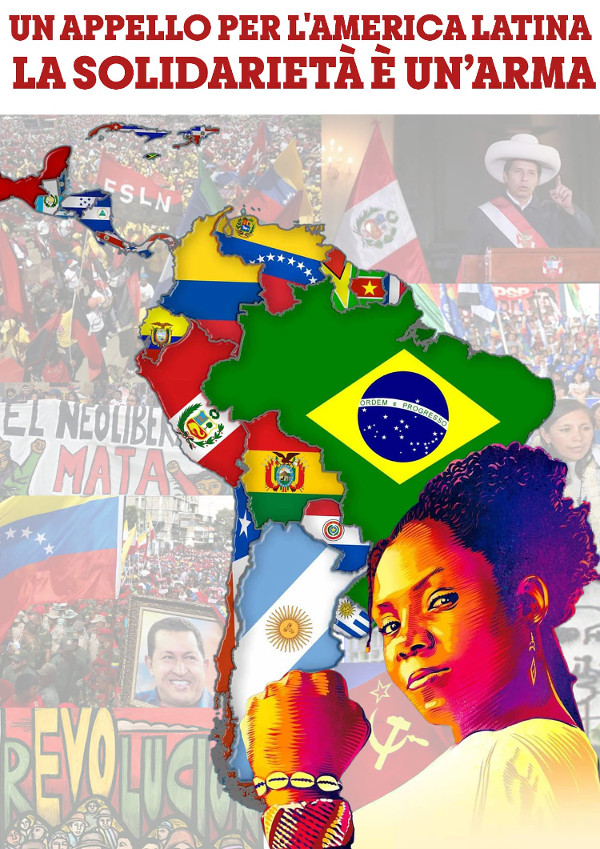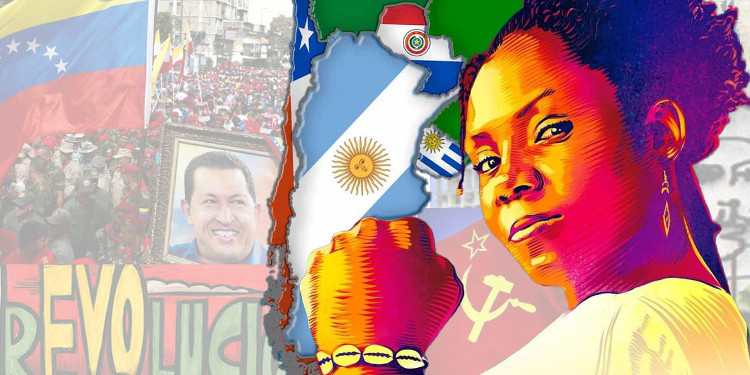| english | español | français | italiano |
In Latin America, a variegated progressive wave is taking shape that is challenging neo-liberal policies, challenging the hegemony of the United States and the neo-colonialist practices of the European Union.
What is happening on the continent is a hope for the whole of humanity that must make solidarity with this multifaceted emancipation process a central political axis in our country.
Whether it is a matter of socialist countries, progressive governments or political and social movements of a different nature, it is clear that in Latin America, for years now, history has been moving in the opposite direction to that hypothesised by the apologists for capitalist globalisation who wanted to relegate the continent to the role of a periphery economically integrated into the Western value chains and politically subordinate to the major imperialist powers.
Instead, the continent has become a political laboratory where the needs of the majority of the population are trying to assert themselves – in various forms – against a system that ensures an income position for the traditional oligarchies and their international sponsors.
The last year has seen the consolidation of those historical experiences of socialist transformation – socialist Cuba, Sandinista Nicaragua and Bolivarian Venezuela – despite US attempts at political destabilisation, carried out with a wide range of instruments from economic blockade to attempts at international isolation, to forms of hybrid warfare.
These countries have been subjected to a hammering media campaign of defamation on their transition processes with toxic narratives that have found space in Italy even among the ranks of the radical left that does not seem to have really cut the bridges with Eurocentrism and the cultural legacies of imperialism.
These countries are also defining a framework of international relations that – while maintaining their political autonomy – tends to “unhook” them more and more from the value chains of the West, giving shape to an effectively multipolar world that undermines the foundations of US supremacy and the neo-colonial aspirations of the European oligarchies.
But this continental “Axis of Hope” has been enriched, thanks to electoral successes, by other countries whose governments intend to embark on a political course that combines popular sovereignty with the redistribution of the material wealth that hitherto benefited Western multinational capital and the national oligarchies linked to it.
In Bolivia, Peru, Honduras and most recently Chile, the forces of change have triumphed, turning a new leaf in these countries or laying the foundations for a chance at progressive transformation.
In still other states, powerful social movements are challenging reactionary governments that are struggling to consolidate their creaking power, as in Ecuador, or challenging the blackmail of debt imposed by international financial institutions, as in Argentina. In general, it is difficult to find a country where the worsening of living conditions due to predatory and hyper-exploitative policies has not produced significant popular mobilisations, and laid the foundations for a consequent political outlet.
In this context, this year there will be two important electoral processes, particularly in Colombia and Brazil, two countries where progressive forces could put an end to pro-oligarchic and pro-US governments, reinforcing the tendency to change neo-liberal and pro-imperial political structures.
In Colombia, the elections will be held at two separate but related times, with the first vote in mid-March to elect parliamentary representatives and the presidential elections on 19 May – with a possible run-off the following month.
In Brazil, the elections will take place in October.
In both countries the ruling elites do not seem to have found the political alchemy that will allow them to keep the levers of power.
It would be naive to think that the United States and the European Union, in a context of fierce international competition, would not try to use all the means at their disposal (political, economic and military) to block and reverse this process of emancipation by bringing the continent back into their spheres of influence.
This is also why we believe it is essential to organise a national meeting on Latin America (on Sunday 6 March in Bologna) that provides an overall view of what is happening on the continent and gives a voice to those at the centre of these processes of transformation.
A meeting that must relaunch the theme of internationalist solidarity and discuss the appropriate ways to develop it, especially in view of the important electoral and referendum deadlines (Colombia, Brazil and Chile), the commitments that await the political agenda of progressive governments, and the important struggles that Latin American movements are carrying out.
The meeting will take place from H10:00 onwards at the Arci Guernelli circle, in Via Antonio Gandusio 6, Bologna (Quartiere San Donato).
First signatories (in updating)
Andrea Puccio, journalist and blogger ; Andres Barreto, political activist (Venezuela) ; Gabriel Caisaletin, political activist (Ecuador) ; Ernesto Screpanti, professor of economics Univ. Di Siena; Luciano Vasapollo, professor Univ. La Sapienza University and member of the International Secretariat of the Red de Intelectuales, Artistas y Movimientos Sociales “En Defensa de la Humanidad” (REDH); Maria Sandoval, Chile@s en la Toscana; Pacto Histórico International Italia (Colombia); Partido Político Peruano Perú Libre Base Roma; Rete dei Comunisti; Rita Martufi, director Centre for the Study of Economic and Social Transformation (CESTES) and Coordinator Italian Chapter REDH.
To sign the appeal and ask for information about the meeting on 6 March in Bologna: americalatinasperanza@gmail.com.


